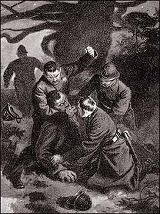“Great excitement was caused in Esher and the neighbouring district when it was learned late last night that an arrest had been effected in connection with the Oxshott murder. It will be remembered that Mr. Garcia, of Wisteria Lodge, was found dead on Oxshott Common, his body showing signs of extreme violence, and that on the same night his servant and his cook fled, which appeared to show their participation in the crime. It was suggested, but never proved, that the deceased gentleman may have had valuables in the house, and that their abstraction was the motive of the crime. Every effort was made by Inspector Baynes, who has the case in hand, to ascertain the hiding place of the fugitives, and he had good reason to believe that they had not gone far but were lurking in some retreat which had been already prepared. It was certain from the first, however, that they would eventually be detected, as the cook, from the evidence of one or two tradespeople who have caught a glimpse of him through the window, was a man of most remarkable appearance - being a huge and hideous mulatto, with yellowish features of a pronounced negroid type. This man has been seen since the crime, for he was detected and pursued by Constable Walters on the same evening, when he had the audacity to revisit Wisteria Lodge. Inspector Baynes, considering that such a visit must have some purpose in view and was likely, therefore, to be repeated, abandoned the house but left an ambuscade in the shrubbery. The man walked into the trap and was captured last night after a struggle in which Constable Downing was badly bitten by the savage. We understand that when the prisoner is brought before the magistrates a remand will be applied for by the police, and that great developments are hoped from his capture.”

“Really we must see Baynes at once,” cried Holmes, picking up his hat. “We will just catch him before he starts.” We hurried down the village street and found, as we had expected, that the inspector was just leaving his lodgings.
“You’ve seen the paper, Mr. Holmes?” he asked, holding one out to us.
“Yes, Baynes, I’ve seen it. Pray don’t think it a liberty if I give you a word of friendly warning.”
“Of warning, Mr. Holmes?”
“I have looked into this case with some care, and I am not convinced that you are on the right lines. I don’t want you to commit yourself too far unless you are sure.”
“You’re very kind, Mr. Holmes.”
“I assure you I speak for your good.”
It seemed to me that something like a wink quivered for an instant over one of Mr. Baynes’s tiny eyes.
“We agreed to work on our own lines, Mr. Holmes. That’s what I am doing.”
“Oh, very good,” said Holmes. “Don’t blame me.”
“No, sir; I believe you mean well by me. But we all have our own systems, Mr. Holmes. You have yours, and maybe I have mine.”
“Let us say no more about it.”
“You’re welcome always to my news. This fellow is a perfect savage, as strong as a cart-horse and as fierce as the devil. He chewed Downing’s thumb nearly off before they could master him. He hardly speaks a word of English, and we can get nothing out of him but grunts.”
“And you think you have evidence that he murdered his late master?”
“I didn’t say so, Mr. Holmes; I didn’t say so. We all have our little ways. You try yours and I will try mine. That’s the agreement.”
Holmes shrugged his shoulders as we walked away together. “I can’t make the man out. He seems to be riding for a fall. Well, as he says, we must each try our own way and see what comes of it. But there’s something in Inspector Baynes which I can’t quite understand.”